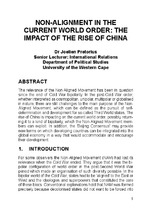Non-alignment in the current world order. The impact of the rise of China
Abstract
The relevance of the Non-Aligned Movement has been in question since the end of Cold War bipolarity. In the post-Cold War order, whether interpreted as cosmopolitan, unipolar, multipolar or globalised in nature, there are still challenges to the main purpose of the Non-Aligned Movement, which can be defined as the pursuit of self-determination and development for so-called Third World states. The rise of China is impacting on the current world order, possibly returning it to a kind of bipolarity, which the Non-Aligned Movement members can exploit. In addition, the 'Beijing Consensus' may provide new terms on which developing countries can be integrated into the global economy in a way that would accommodate and encourage their development.

